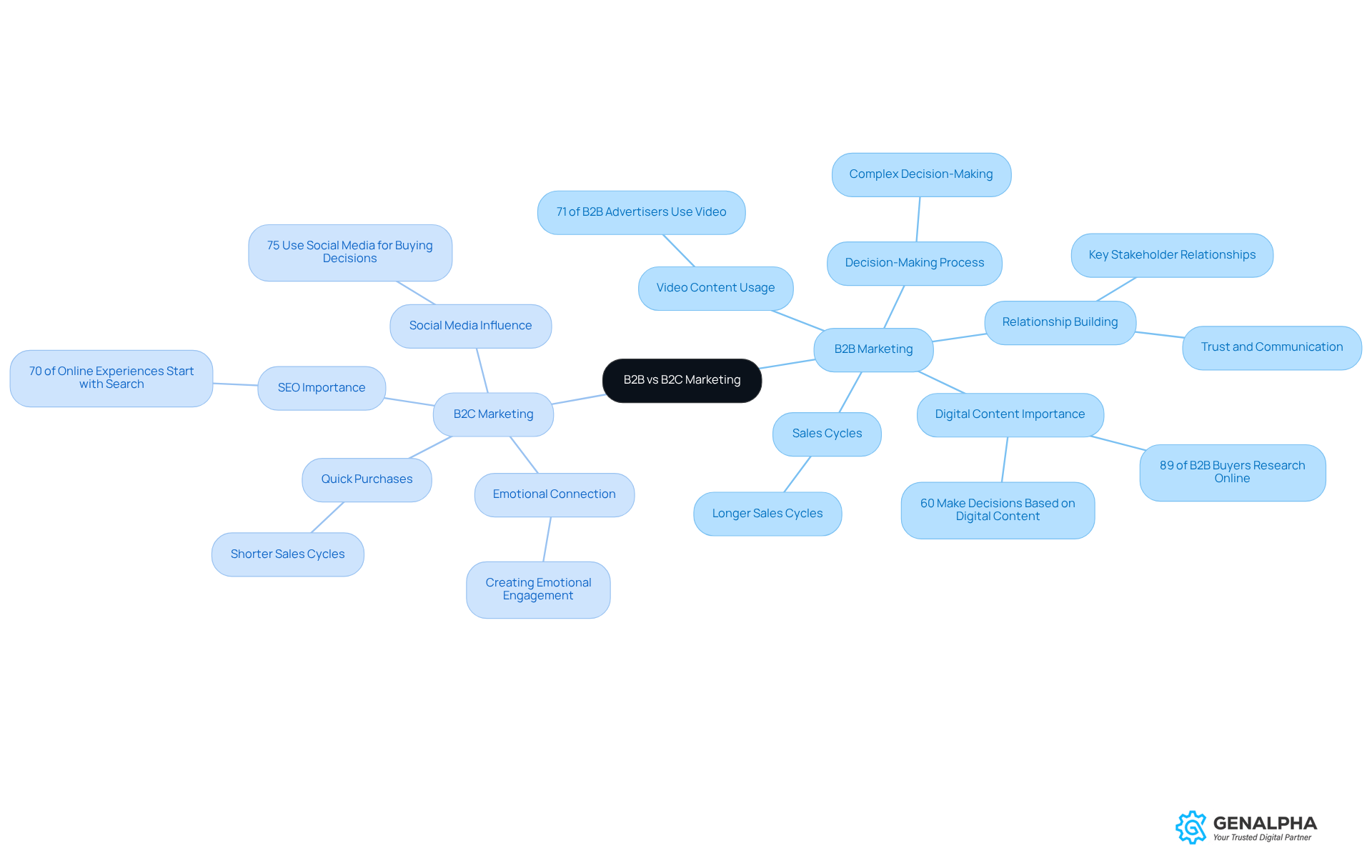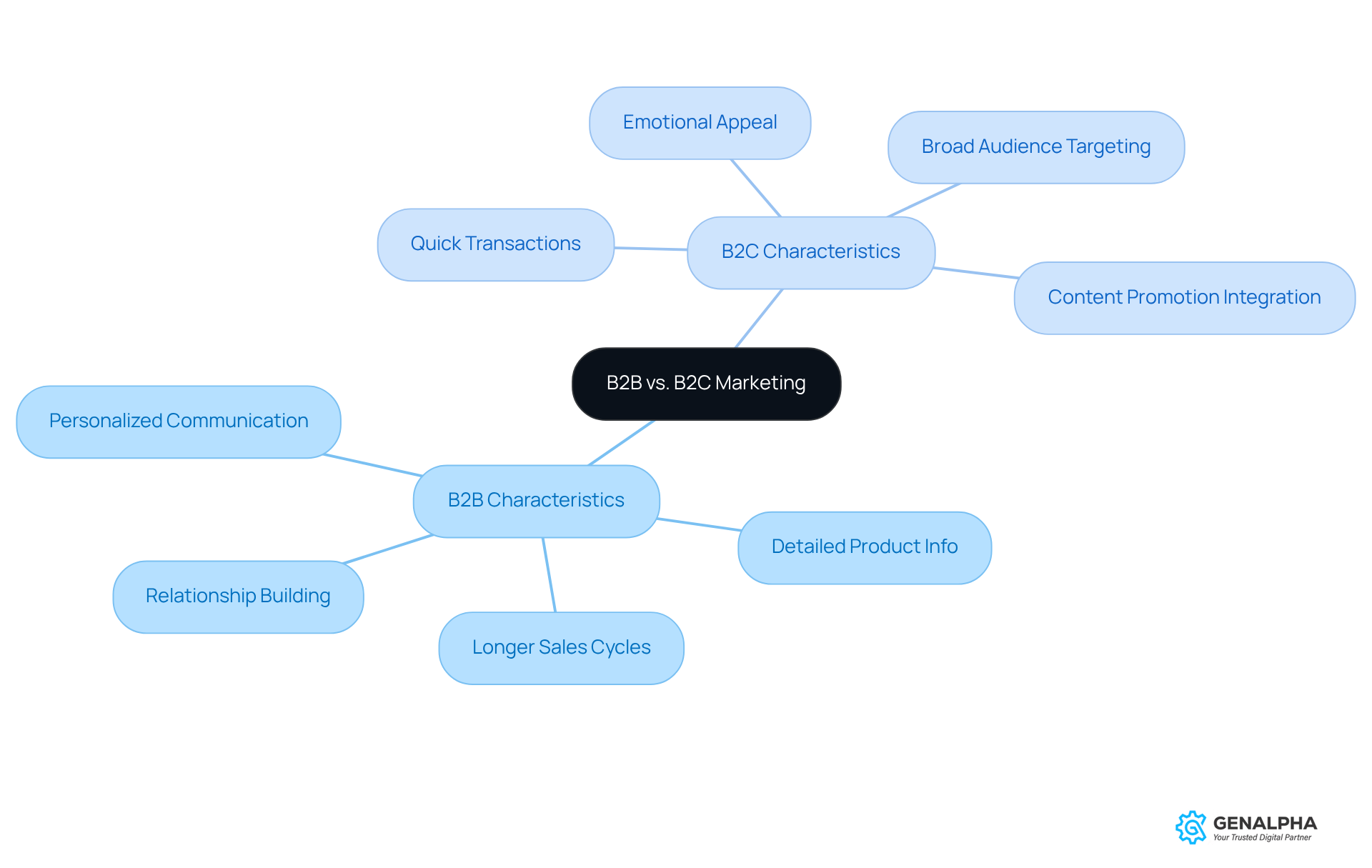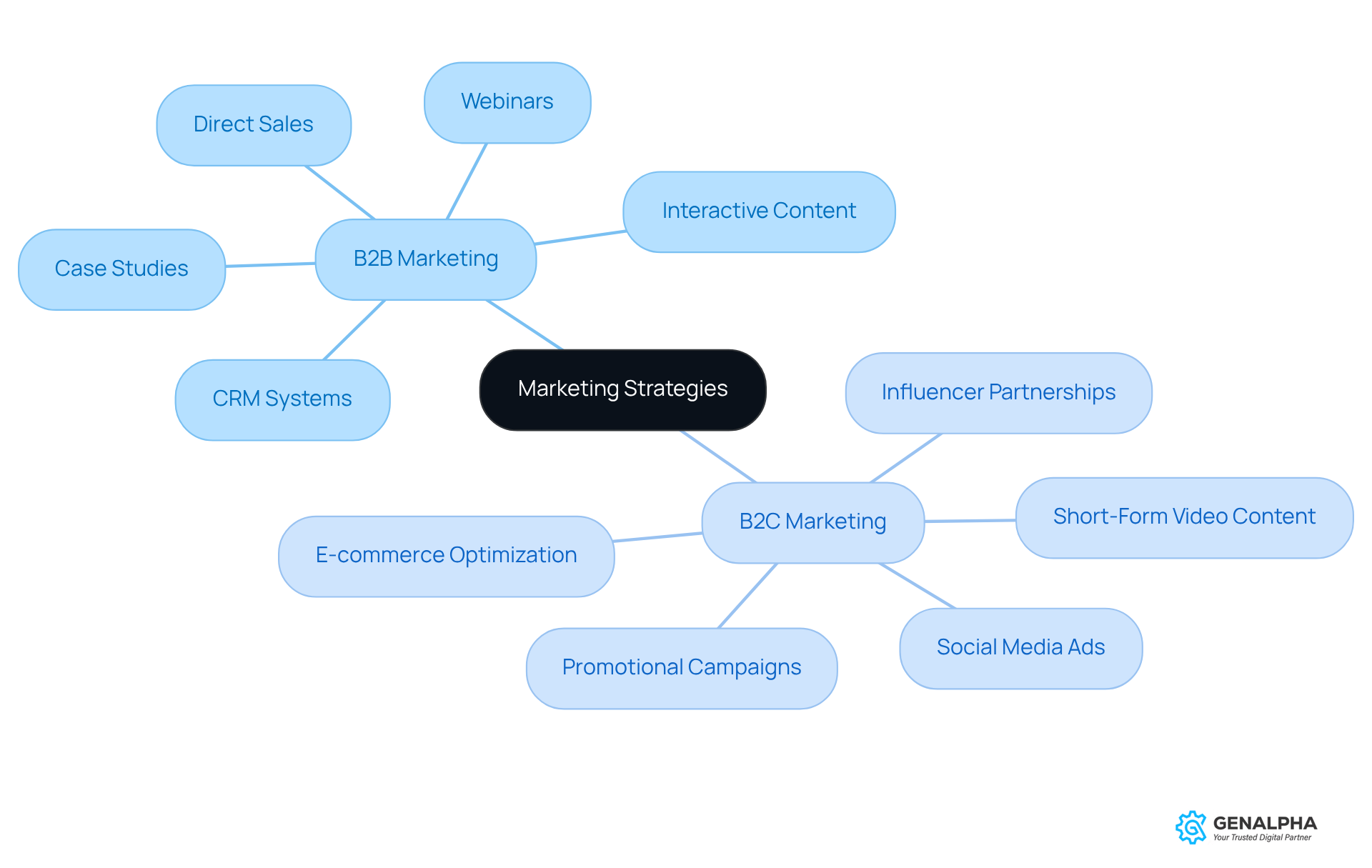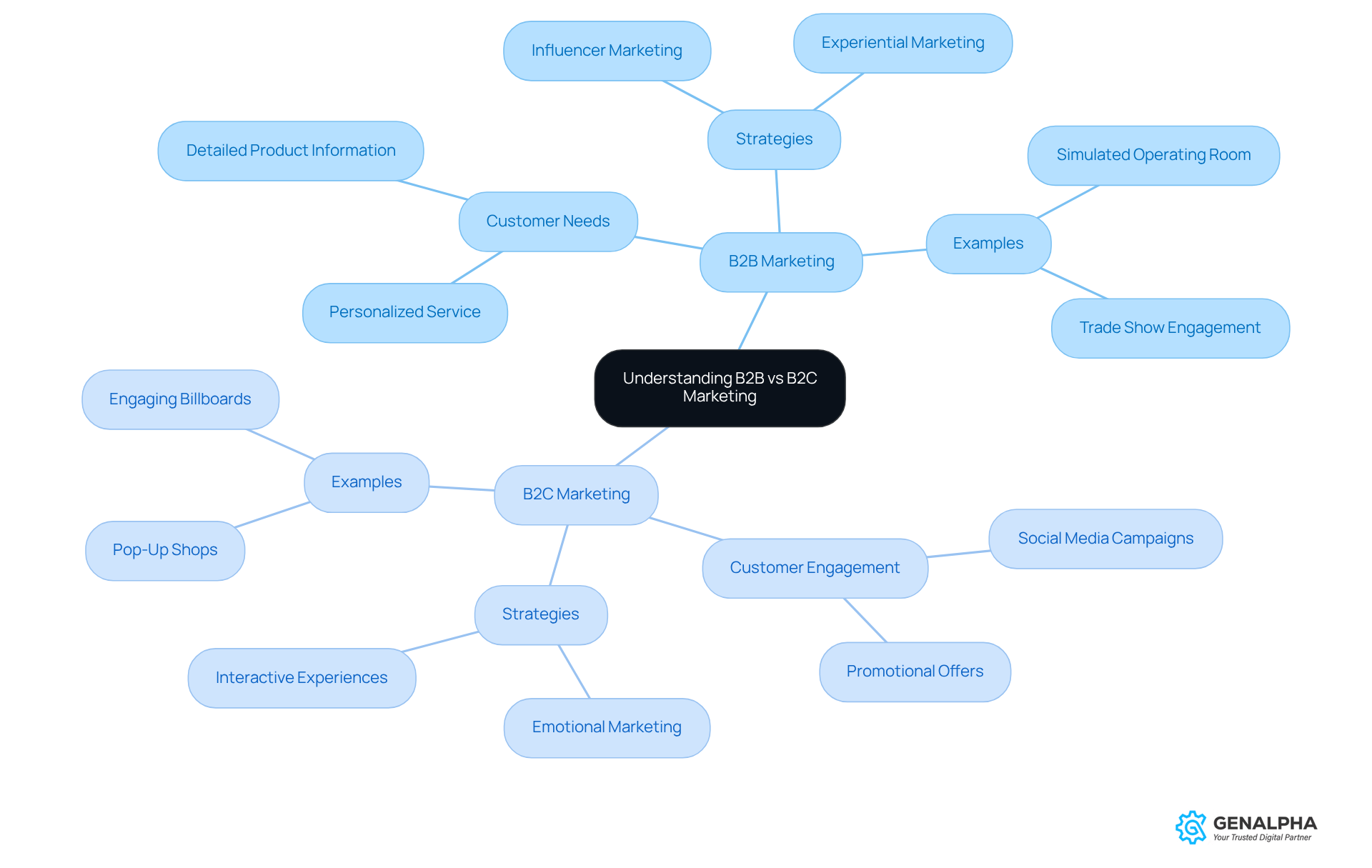Overview
When we think about marketing, it’s important to understand the difference between B2B (Business-to-Business) and B2C (Business-to-Consumer) approaches. B2B marketing is all about building solid relationships and often involves longer sales cycles, while B2C focuses on connecting with individual consumers through emotional appeals and quick purchasing decisions. Have you ever noticed how these strategies play out in real life?
For example, in B2B, companies tend to emphasize informative content and personalized outreach. This helps in nurturing relationships over time. On the flip side, B2C marketing prioritizes brand loyalty and aims for immediate sales through engaging promotions. Isn’t it fascinating how these different approaches cater to their respective audiences?
Understanding these differences is crucial for tailoring your marketing strategies effectively. By recognizing what works for each type, you can better connect with your audience. So, whether you're crafting a detailed email for a business partner or designing a catchy social media ad for consumers, keep these distinctions in mind. What strategies will you try next to enhance your marketing efforts?
Introduction
Understanding the nuances between B2B and B2C marketing is crucial for any business looking to sharpen its competitive edge. Have you ever thought about how different these two approaches really are? While B2B marketing focuses on building long-term relationships and navigating complex sales cycles, B2C marketing thrives on emotional connections and quick purchasing decisions. This contrast raises an important question: how can marketers effectively tailor their strategies to meet the distinct needs of these two audiences? By exploring these differences, we not only enhance customer engagement but also drive sales efficiency. So, how can we adapt our approaches accordingly?
Define B2B and B2C Marketing
B2B (Business-to-Business) promotion is all about how companies reach out to other businesses to offer their products or services. It’s a bit of a different ball game compared to the difference between B2B and B2C promotion. In B2B, the sales cycles tend to be longer, and the decision-making process can get pretty complex. Plus, building strong relationships with key stakeholders is crucial. Did you know that a whopping 72% of B2B sellers' time is spent on non-selling activities? This really highlights how intricate B2B promotion can be and why having efficient strategies in place is so important.
On the flip side, B2C promotion is focused on individual consumers. Here, it’s all about creating emotional connections and making those quick purchasing decisions. B2C typically features shorter sales cycles and aims to engage consumers through appealing content and direct promotions. Recent trends show that 70% of online experiences kick off with a search engine, which underscores the significance of SEO in both B2B and B2C strategies.
Speaking of research, 89% of B2B buyers do their homework online before making a purchase, and 60% of them make their final decisions based on digital content. This really emphasizes the need for businesses to provide valuable digital content. Meanwhile, as B2C promotion keeps evolving, emotional engagement stays key. In fact, 75% of buyers use social media to guide their purchasing decisions.
And let’s not forget about video content! A solid 71% of B2B advertisers are leveraging it, making it an increasingly vital tool for engaging audiences. Understanding the difference between B2B and B2C is essential for crafting effective promotional strategies that are tailored to each audience. So, how are you planning to adapt your strategies to meet these unique needs?

Explore Key Characteristics of B2B vs. B2C Marketing
When we think about B2B commerce, what comes to mind? It's all about building relationships, navigating longer sales cycles, and having detailed product information at your fingertips. B2B marketers really focus on personalized communication, providing extensive support to decision-makers. On the flip side, B2C promotion is a different ballgame. It leans heavily on emotional appeal, quick transactions, and targeting a broad audience. Think about it: while a B2B campaign might dive deep into a detailed whitepaper, a B2C campaign often revolves around a catchy ad that pulls at your heartstrings.
Now, here’s a stat that might surprise you:
- 70% of B2C professionals are integrating content promotion into their strategies. This really highlights how crucial it is to engage consumers effectively.
- But wait—only 37% of B2C promoters have a solid content approach recorded. That’s a tough spot to be in when it comes to strategic planning!
- Looking ahead, 62% of B2C marketers are gearing up to adopt influencer strategies in 2024, showing just how important social proof is becoming in shaping consumer choices.
- And let’s not forget about ROI; 46% of B2C promoters see measuring it as one of their top five content-related challenges. It’s clear that figuring out effectiveness in this sector can be tricky.
Have you noticed how 78% of people turn to social media first when searching for brand information? This really underscores the vital role these platforms play in B2C marketing. Plus, the importance of retention plans can’t be overstated—customer retention and loyalty metrics are key for B2C marketers, especially when dealing with shorter customer relationships. This stark contrast reveals the different between B2B and B2C approaches, showing how essential it is for marketers to tailor their strategies to meet the unique needs of their audiences. As Robert Leonard puts it, "Content promotion has assisted me in attracting new clients and expanding my audience."
So, how are you planning to adapt your marketing strategies to resonate with your audience?

Analyze the Impact of B2B and B2C Differences on Marketing Strategies
When we consider B2B and B2C marketing, it's evident that the difference between B2B and B2C influences how each targets their audience. B2B marketers really focus on building relationships and delivering long-term value. They often nurture leads with informative content and personalized outreach. This might look like:
- Hosting webinars
- Sharing detailed case studies
- Having direct sales interactions
All aimed at fostering trust and engagement. For instance, a B2B company could implement a sophisticated CRM system to enhance client relationship management, ensuring every interaction is tailored to what the client needs. Interestingly, B2B e-commerce is growing at double the speed of B2C, highlighting the increasing importance of digital strategies in this space.
On the flip side, B2C marketers are all about brand loyalty and making those immediate sales. They use strategies like:
- Social media ads
- Influencer partnerships
- Promotional campaigns
To drive quick purchasing decisions. The surge of short-form video content, for example, has been a game-changer in grabbing consumers' attention and encouraging impulse buys through engaging storytelling. A B2C company might focus on optimizing its eCommerce platform to create a seamless shopping experience, making it easy for customers to navigate and complete their purchases.
As B2B strategies evolve, they’re starting to borrow tactics from the B2C playbook, like influencer promotions and interactive content to spark dynamic engagement. AJ Wilcox points out that personal video content can build trust faster than traditional formats, showcasing the growing role of video in B2B marketing. This blending of approaches reflects a broader trend where B2B marketers are recognizing the difference between B2B and B2C, particularly the importance of connecting with the emotional and experiential sides of their audience. By integrating these methods, they not only boost brand visibility but also cultivate lasting relationships, ultimately driving sales and customer loyalty across both sectors. Plus, the rise of the industrial metaverse is making a significant impact on B2B marketing, changing how companies engage with their audiences.

Discuss the Importance of Understanding B2B and B2C Marketing
Getting a grip on the different between B2B and B2C marketing is super important for businesses looking to make the most of their marketing efforts. Have you ever thought about how different your audience's needs can be? By understanding what makes your target customers tick, you can customize your messaging, content, and engagement strategies to really connect with them. This not only boosts customer satisfaction but also ramps up sales efficiency and builds long-lasting relationships.
For instance, imagine a manufacturer that’s focused on other businesses. They might find that a detailed product catalog and personalized service work wonders for them. On the flip side, a retailer selling directly to consumers could hit the jackpot with engaging social media campaigns and enticing promotional offers. So, what strategies will you consider to better reach your audience?

Conclusion
Understanding the differences between B2B and B2C marketing is super important for businesses that want to make the most of their marketing strategies. Each approach speaks to different audiences, which means they need tailored messaging and engagement tactics that really hit home. By recognizing these differences, businesses can boost customer satisfaction, streamline their sales processes, and build long-lasting relationships with their clients.
So, what sets B2B apart from B2C? Well, B2B is all about relationship-building and longer sales cycles. It emphasizes personalized communication and detailed content. On the flip side, B2C focuses on emotional engagement and quick purchasing decisions, often using social media and influencer marketing to grab consumer attention. Plus, the rise of video content and digital strategies shows how both sectors are evolving, borrowing tactics from each other to enhance their effectiveness.
Ultimately, getting a handle on the nuances of B2B and B2C marketing isn’t just a nice-to-have; it’s essential for businesses looking to thrive in their markets. As marketing landscapes continue to change, embracing these differences and adapting strategies can lead to greater brand visibility, customer loyalty, and increased sales. So, why not take a moment to assess your marketing approach? Think about how you can better connect with your target audiences to stay competitive in this dynamic environment.
Frequently Asked Questions
What is B2B marketing?
B2B (Business-to-Business) marketing involves companies reaching out to other businesses to offer their products or services. It typically features longer sales cycles and a complex decision-making process, with a strong emphasis on building relationships with key stakeholders.
What percentage of B2B sellers' time is spent on non-selling activities?
A significant 72% of B2B sellers' time is spent on non-selling activities, highlighting the complexity of B2B promotion.
What is B2C marketing?
B2C (Business-to-Consumer) marketing focuses on individual consumers, aiming to create emotional connections and facilitate quick purchasing decisions. It usually involves shorter sales cycles and engages consumers through appealing content and direct promotions.
How important is SEO in B2B and B2C marketing?
SEO is crucial in both B2B and B2C marketing, as recent trends indicate that 70% of online experiences begin with a search engine.
How do B2B buyers conduct their research before making a purchase?
A notable 89% of B2B buyers conduct their research online before making a purchase, with 60% of them making final decisions based on digital content.
What role does emotional engagement play in B2C marketing?
Emotional engagement is key in B2C marketing, with 75% of buyers using social media to influence their purchasing decisions.
How is video content utilized in B2B marketing?
Video content is increasingly important in B2B marketing, with 71% of B2B advertisers leveraging it to engage their audiences effectively.
Why is it important to understand the difference between B2B and B2C marketing?
Understanding the differences between B2B and B2C marketing is essential for crafting effective promotional strategies tailored to each audience's unique needs.




